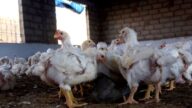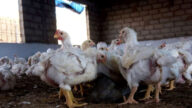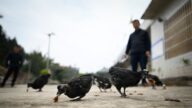【新唐人2013年04月12日訊】據大陸官方報導,中科院聲稱,通過研究發現,H7N9禽流感病毒來自於野鳥和家禽中的禽流感病毒基因重配,對人致病是極小概率的隨機事件,應該不會造成大面積傳播。但這種說法完全無法令民眾信服,並遭到大量網友的反駁。海外專家指出,「概率小」這種說法本身不符合病毒學,也不負責任。
據《新華社》和《央視》新聞聯播報導,中國科學院微生物所研究結果顯示,H7N9禽流感病毒基因來自於東亞地區野鳥和中國上海、浙江、江蘇雞群的基因重配。中科院聲稱,這種基因重配是一種常見現象,但對人類致病,是極小概率的隨機事件,不會造成大病毒、大範圍傳播。但這種說法遭到了專家的駁斥。
美國華盛頓DC病毒學專家醫學博士林曉旭:「這不是一個概率的問題,這個說法本身就不是符合病毒學的說法,沒有人這麼說。而且甚麼『概率性很小』,這個說法本身就不是很專業的一種說法,你怎麼算這個概率呢?現在對這個病毒有甚麼研究結果啊,我沒有看到有任何確切的實驗數據報導出來啊﹗所以他說的研究結果是甚麼啊?」
一位自稱學術界的網友炮轟中科院,他說,作為一個科學工作者,連一個科學的嚴謹性都沒有嗎?有臉說「隨機事件」,既然是「概率」,就要有一個百分比的數字。幾率無論多小,這個都是有論證的。而就算小,甚麼是小?一個正規的學術報告絕對不會只寫小。而是拿到實際數據後對比性的去寫。
這名網友還說,既然沒研究清楚,就回去實驗室研究去。不懂,就不要瞎出來說。
而另一位網友則犀利的指出,中共當局強調中科院的「概率說」,就是企圖利用群眾對一些科學概念的無知,從而誤導民眾,以達到掩蓋真相的目地。只是沒想到,百姓已經越來越難「糊弄」了。
江蘇常州周先生:「他們政府一貫是這樣的,沒有甚麼公信力了。中國可能隱瞞事實還是比較很多,公開的信息並不是很多,按照慣例,如果它 公布了死多少人,起碼它要隱瞞十倍吧!」
山東煙臺網友(甄的忘不了)說:想起非典時期,衛生部請的世界衛生組織官員來,在廣州作秀,宣稱非典不傳染,找了幾個群眾演員裝作治癒出院病人,矇騙全國人民,後來摀不住了,後果大家都知道了…。
北京「益仁平中心」負責人 陸軍:「政府會認為真實情況如果是被披露出來的話,可能會引起公眾的恐慌,不利於所謂的社會的穩定,但其實呢恰恰這個邏輯是完全錯誤的。政府他隱瞞真相,掩蓋信息,反而會使公眾對於自己所處的狀況到底有多危險,感到心裡沒底,同時也會對政府的公信力產生質疑,而最終的這種恐慌和質疑的情緒反而帶來不穩定。」
美國華盛頓DC病毒學專家醫學博士林曉旭:「政府要想避免民眾恐慌,我覺得就是要訊息更多透明,把更多檢測到的樣品的數據啊、更多的疑似病例啊,這些事情都公布出來,讓社會上能夠更了解整個情況,這樣就好了。」
據了解,這次的H7N9禽流感病毒在禽類身上呈現弱毒性,在人身上卻極具破壞力。專家分析:病毒自身基因變異,可能是H7N9型禽流感病毒感染人,並導致高死亡率的原因。同時,據中國科技部最新消息說,將會在7個月內完成研製H7N9禽流感預防性疫苗。但民眾依然覺得時間過長。
Is H7N9’s Infection Probability Small?
According to Mainland official reports, the Chinese
Academy of Sciences claimed that through research,
it was found that the H7N9 avian virus comes from
wild birds and domestic poultry,
proposing only a small probability of infecting
human beings, and should not cause a large-scale spread.
But this message has not convinced the public,
and many netizens refute it.
Overseas experts point out that “small probability” itself
does not follow the principles of virology.
It is also irresponsible to suggest it.
According to the Xinhua News and CCTV News Network,
the Institute of Microbiology at the Chinese Academy
of Science found that genes of the H7N9 virus come from
wild birds of East Asia and domestic poultry from Shanghai,
Zhejiang and Jiangsu Provinces.
It is a result of gene re-assortment.
However, there is an extremely small probability
of a random incident of infecting human beings;
it will not become a serious pathogen or cause
wide dissemination.
Yet, this idea has met refutation from other virologists.
Dr. Lin Xiaoxu, a virologist in US:
“This is not a question of probability.
This argument is not in line with the principles of virology.
No one would make such remarks.
It is very unprofessional.
How do you calculate the probability?
What kinds of findings of this disease do they have?
Where are the data and reports?
What research results do they have?"
A self-proclaimed academic netizen:
“As scientists, they lack preciseness.
If you dare mention probability and random events,
you need to show a percentage figure.
What is a small probability?
No matter how small, one has to validate it with data.
A formal academic report will not use just the word small,’
but provide data to illustrate the point.
He added, “If you don’t know for sure, go back
to the laboratory. Don’t come up with nonsense.”
Another netizen sharply pointed out that Chinese official
attempt to misguide the public, who lack scientific concepts,
and thus, reach their goal of hiding the truth.
They didn’t expect the public to become harder to fool.
Mr. Chow from Zhangzhou, Jiangsu:
“Our government has always been like this.
They have no credibility and like to conceal the truth.
We have very little public information.
In accordance with established practice, the death cases
will be ten times what they have announced.”
Shandong Yantai netizen: “During the SARS period,
the Ministry of Health invited WHO officials
to put on a show in Guangzhou, claiming that
SARS is not contagious.
They found a few actors to play cured SARS patients
to fool the entire Chinese population.
Later, they could no longer hide the facts,
and everyone learned the truth.”
Lu Jun, director of Beijing Yi Ren Ping Center:
“Our Government thinks the truth will cause public panic
and is not good for social stability.
In reality, it is just the opposite.
This kind of logic is totally wrong.
When our government conceals the real situation,
the public will be afraid of the unforeseen danger
they would be facing.
Then, they lose confidence in the government.
Their fear and doubt will definitely bring instability.
Dr. Lin Xiaoxu: “If the Government wants to avoid public
panic, it should be more transparent, test more samples,
and publicize more data and more suspected cases.
Let the society understand the whole situation."
It is understood that the H7N9 avian influenza virus in birds
shows only weak toxicity, but in humans, it is devastating.
Experts state that the viral gene mutation may be the cause
of human infection and of the high mortality.
Meanwhile, the Chinese Ministry of Science and Technology
says a vaccine against the H7N9 will be developed within seven months.
But, the public feels that seven months is much too long.



























